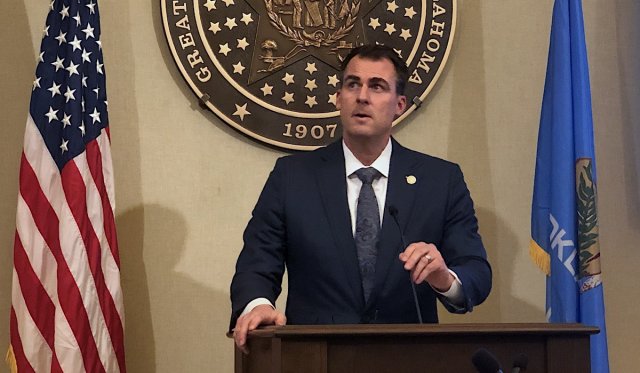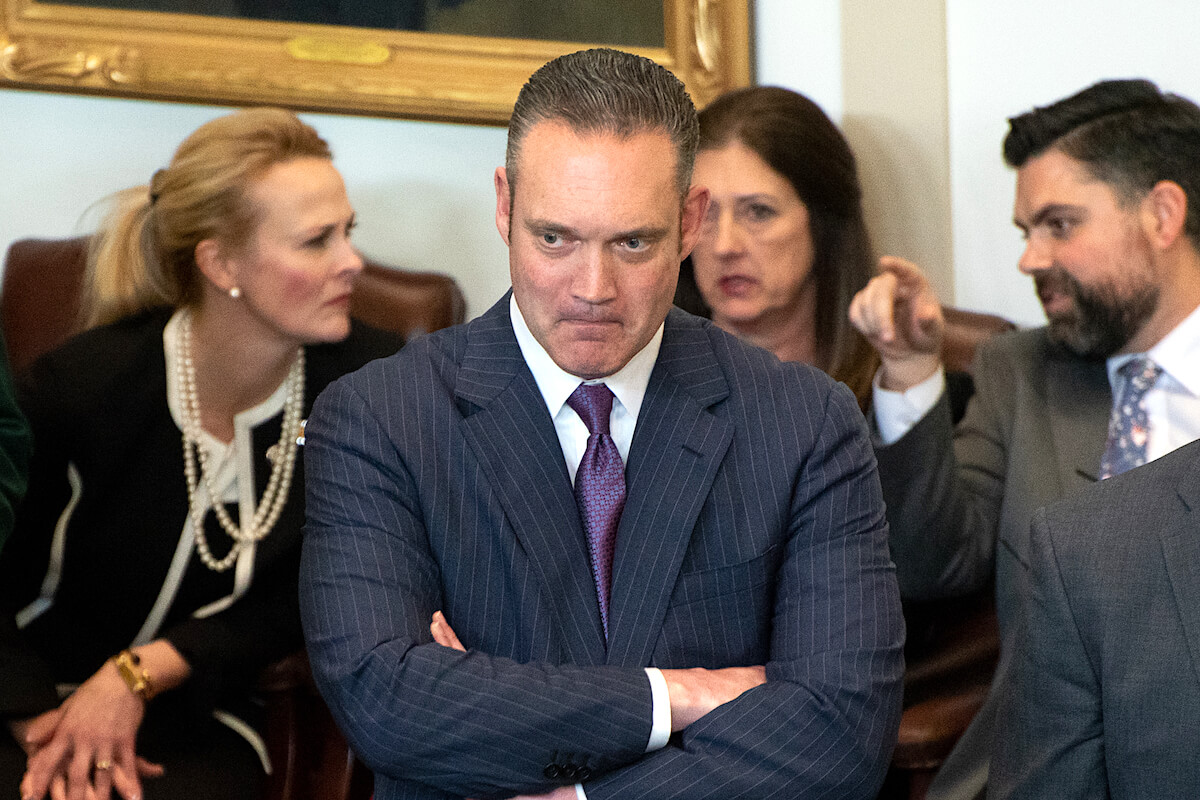
Oklahoma Gov. Kevin Stitt uncapped his veto pen again Tuesday and struck down seven more measures sent to him by the Republican-dominated state Legislature. Five of those seven bills were authored by House Speaker Charles McCall (R-Atoka), and all passed with strong bipartisan support — at least 89 votes in the House and at least 40 votes in the Senate.
Legislative efforts blocked by the GOP governor — at least temporarily — included the creation of a new Rural Broadband Council, two measures favoring tag agencies and a measure authorizing any legislator to inspect any state contract. Tuesday’s seven vetoes bring Stitt’s total to 15 this session, which featured tension between the first-term governor and legislative leaders.
While the governor’s first four budget-related vetoes of the 2020 legislative session were overridden by lawmakers last week, it’s not immediately clear whether the House and Senate intend to attempt overrides on the four bills he vetoed Monday or the seven he vetoed Tuesday.
Pushing any measure into law despite the objection of the governor requires the support of 68 House members and 32 Senate members. The Legislature left the door open to returning for veto overrides before May 29, and the House is expected to be in session for at least ceremonial purposes Friday, May 22.
Asked for comment about the vetoing of five McCall bills, spokesman John Estus said, “The House will respond in due course.”
Feud fueled on tag agent rules

Stitt struck down two bills that established statutory protections and mandates of use for tag agents, which are independent contractors that provide motor vehicle registration and other services across the state.
HB 3663 changed the terms of tag agents’ operations with the state from “at will” to “for cause” and established a series of rules by which a tag agent could be removed from its appointment by the state. It passed the House 93-1 and the Senate 44-0.
Stitt wrote in his veto message that tag agents, which are appointed by the Oklahoma Tax Commission, do not need the additional statutory protection.
“In the last 15 years, 16 tag agents have been removed. That represents an average of one per year, less than four-tenths of 1 percent of all agents. There is no evidence that the OTC has been removing agents without cause,” Stitt wrote. “The provisions of this bill would restrict the ability of a state agency to determine if a contractor should be permitted to continue to work to deliver services. This greatly restricts the state’s ability to ensure that the best people are delivering services to Oklahomans.”
Stitt said HB 3663 would limit the Tax Commission’s authority to terminate a tag agent even if the state agency received multiple public complaints about one contractor.
“In addition, the creation of a new unnecessary bureaucratic procedure would result in unwanted legal fees on the backs of taxpayers,” Stitt wrote. “It is important that my administration have the ability to weed out bad actors, ensuring the best possible customer service from tag agents for all 4 million Oklahomans.”
Stitt also vetoed HB 4049, which changed the dedication of fees related to online motor vehicle registrations conducted by tag agencies. It passed the House 89-0 and the Senate 45-0, but Stitt wrote in his veto message that the bill impeded his administration’s efforts to digitally transform all areas of state government.
“My vision for Oklahoma is to one day offer all state services conveniently through an application on mobile devices. As my administration has worked towards this goal, we have encountered bureaucratic red tape and statutory barriers which prevent these innovative processes,” Stitt wrote. “HB 4049 would remove the Oklahoma Tax Commission’s ability to operate an online portal for motor vehicle registration and mandates that their online system direct customers to [tag agents]. Instead of an Oklahoman being able to quickly choose to renew a vehicle tag online and have the Oklahoma Tax Commission promptly handle their request, the consumer would have to select a [tag agent] to handle the online claim.”
The two vetoes related to tag agencies continue a dispute between the Stitt administration and tag agents over what role the independent contractors should play in providing state services. The debate has played out mostly behind the scenes, with the Oklahoma Tax Commission sendings tag agents memos (embedded below) in the fall 2019 instructing that they could not sign new or renew contracts with private lobbyists owing to an executive order from Stitt related to state agencies and lobbyists. But in 2020, the Tax Commission later notified tag agents that they could continue to have a lobbyist. The Tag Agent Coalition is represented by Clayton Taylor according to current Oklahoma Ethics Commission filings.
 Loading...
Loading...
Broadband council called ‘redundant’

Extending another quiet dispute with the Legislature over how best to improve rural broadband internet access, Stitt axed HB 4018 and SB 1002. HB 4018 created a Rural Broadband Expansion Council to study and map rural broadband access in the state of Oklahoma. The council was set to operate under a series of requirements laid out in the bill, which passed the House 94-2 and the Senate 45-0. SB 1002 was the trailer bill to HB 4018 and increased from 12 to 14 the membership of the Rural Broadband Expansion Council, while specifying qualifications of additional members. It passed the House 86-0 and the Senate 45-0.
In his veto message, Stitt noted that the bill specified funding for the council come from the Digital Transformation Revolving Fund, which lawmakers did not fund for Fiscal Year 2021 and removed remaining Fiscal Year 2020 funds from.
“Digital transformation and bringing Oklahoma into the 21st century has been a top priority for my administration. Last year, the secretary of digital transformation created a broadband task force and brought together stakeholders to focus on improving broadband in our state. Since that time, our administration has moved from being ranked 47th to being ranked 26th in broadband (…). It is important to bring together all key players to collaborate and continue to improve our state’s outcomes in broadband. My office has included key stakeholders in these discussions and invited legislators to attend. Our current broadband task force is yielding great results, and the need for another task force is unnecessary and redundant. This is a duplication of work, expertise and expense.”
Stitt’s veto message did not address specific provisions in HB 4018, which directed the would-be Rural Broadband Expansion Council to value certain positions, such as “maintaining the viability of the Oklahoma Universal Service Fund,” which has been a point of controversy in the telecommunications world.
HB 4018 instructed the would-be council to “give consideration to whether similar universal funds should be implemented in order to facilitate broadband expansion and operational costs for underserved areas.”
But what about the Legislature’s contracts?
HB 3819 made any contract from a state agency open to inspection by any member of the Oklahoma Legislature, and it also banned any agency from prohibiting an employee, contractor or other person to communicate with the Legislature. It passed the House 94-1 and the Senate 44-0.
In his veto message, Stitt said the measure was duplicative, detailed concern about confidential information not being protected under the bill, and observed that the Legislature did not make its own contracts or employees available for inspection.
“Currently, members of the Legislature, like all Oklahomans, have access to contracts made by the executive branch through the Open Records Act. Legislators also have the ability to obtain contracts, including those which may have confidential information, through the Legislative Office of Fiscal Transparency (LOFT). Further, the executive and judicial branches are already required to make personnel available to LOFT and, if necessary, LOFT has the authority to conduct hearings, compel witnesses to testify and require the production of information,” Stitt wrote. “As written, HB 3819 does not require that any information made confidential by law be maintained in confidence by the requesting legislator. It also provides no protection to the integrity of grand juries and internal and external civil and criminal investigations conducted by various agencies. Lastly, while mandating contracts and employees of the executive and judicial branches be available to members of the legislative branch, there is no such requirement for contracts by and employees of the Legislature.”
To fee or not to fee? That is the question
HB 3824 exempted the Legislature and state judicial entities from fees and costs for services rendered by appropriated state agencies. The bill passed the House 89-0 and the Senate 41-3.
“While I understand the Legislature and judiciary provide vital functions to the state, this specific exemption is shifting responsibility from one state entity to another, while all other state entities are required to manage their own costs of services directly,” Stitt wrote in his veto message. “In addition, HB 3824 contains no language guaranteeing additional appropriation to cover the cost of services to be provided to the Legislature and judiciary, which could result in a costly negative fiscal impact in the future. This is an unnecessary shift in responsibility with no statutory guarantee of future appropriations to those providing the services.”
Fee hike halted on private vocational schools
SB 1805 increased fees and changed rules for the Oklahoma Board of Private Vocational Schools. The House passed the bill 93-5, and the Senate passed it 40-7.
RELATED
Hold up: Stitt stops bonds and tax changes with veto pen by Tres Savage
“SB 1805 increases the base fees that private vocational schools must pay to the Oklahoma Board of Private Vocational Schools by 15 percent over the next three years,” Stitt wrote in his veto message. “Our private businesses in the state do a great job of training Oklahomans and preparing our workforce for the jobs of tomorrow. While I agree proper oversight is important to ensure consumers are protected in the state, it is crucial that we do not grow bureaucracy for private institutions looking to train individuals in the labor market. I remain committed to working with our state’s private sector to make Oklahoma the most business-friendly state in the nation.”
Stitt vetoes pay hike for private prison employees
Around 5 p.m. Wednesday, May 20, Stitt announced he had also used a line-item veto to delete section two of HB 4160, which set budget limits for the Oklahoma Department of Corrections. The portion of the bill Stitt vetoed authorized the agency to spend more than $1.1 million “for the equalization of employee pay scales within contracted private correctional facilities.”
Stitt explained his decision in his veto message.
“The state is not contractually obligated to increase private correctional facilities pay scales. In addition, the funds proposed to be used are dedicated to the purpose of the state offender management system,” Stitt wrote. “The offender management system is a critical component of our correctional operations as it serves as the centralized source of offender information for staff, the public and numerous state and federal agencies.”
Previous vetoes
Stitt vetoed four other bills Monday, which dealt with bonds for higher education, a sales tax exemption for OU Medicine and a tax credit for low-income apartment complexes built in rural Oklahoma.
(Update: This story was updated at 5:20 p.m. Wednesday, May 20, to include information about Stitt’s line-item veto within HB 4160.)






















